A former New Zealand prime minister says Washington is the likely culprit behind a signals intelligence system that, according to a report, existed for nearly a decade without the government knowing.
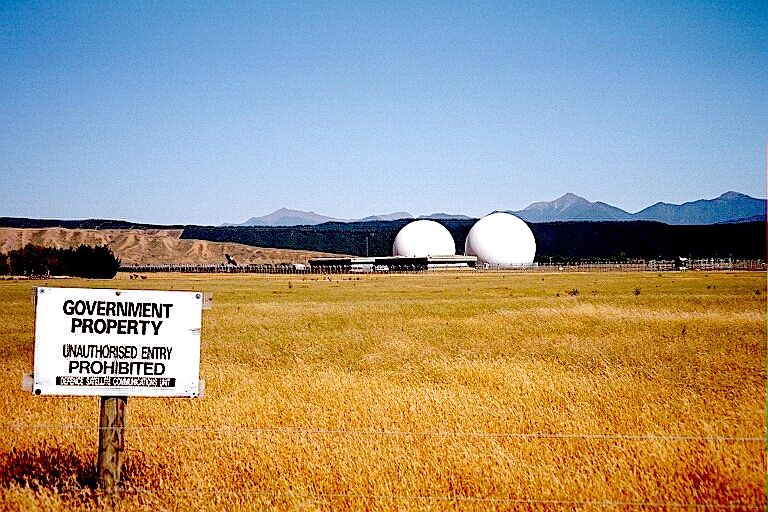
New Zealand’s Government Communications Security Bureau facility in Waihopai. (Schutz, Wikimedia Commons, CC BY-SA 3.0)
By Mick Hall
in Whangarei, New Zealand
Special to Consortium News
 New Zealand’s public should be deeply concerned over revelations its security state facilitated a suspected U.S. intelligence operation capable of supporting military actions for nearly a decade without the New Zealand government’s knowledge, a constitutional lawyer says.
New Zealand’s public should be deeply concerned over revelations its security state facilitated a suspected U.S. intelligence operation capable of supporting military actions for nearly a decade without the New Zealand government’s knowledge, a constitutional lawyer says.
A report has revealed that a signals intelligence system embedded in the country’s Government Communications Security Bureau (GCSB) ran from 2012 to 2020 without ministerial knowledge or approval after a Memorandum of Understanding (MoU) was signed in secret.
The GCSB is the equivalent of the GCHQ in Britain and the NSA in the U.S. It collects, assesses and produces reports on foreign intelligence for other New Zealand agencies.
The GCSB operates a satellite monitoring station at Waihopia near Blenheim and a radio receiving station at Tangimoana at Foxton, both capable of collecting foreign and domestic intelligence.
A report by the country’s Inspector-General of Intelligence Brendan Horsley released last Thursday found that an unnamed country had used the infrastructure to intercept and decode messages that could be used to support “military actions by foreign partners.”
Former New Zealand Prime Minister Helen Clark said the agency behind the scheme likely belonged to the U.S. She told media those responsible for operating it within GCSB should be disciplined for hiding it from government.
The report makes it clear senior staff working on signals intelligence system memos of understanding were aware of how politically significant it was and the potential legal implications it posed.
This awareness would have been partly informed by past reports by the inspector-general. A report in 1999 had probed concerns by then PM Clark that GCSB activities could be unduly focused more on the needs of Five Eyes security partners than New Zealand’s.
Clark was also concerned about the possibility New Zealand citizens themselves could be illegally spied on.
Given prior scrutiny of people like Clark, it seems inconceivable to some that senior GCSB officials would be unaware of U.S. intelligence operation embedded in the organisation without ministerial consultation or approval by their predecessors.
Prime Suspect: the U.S.
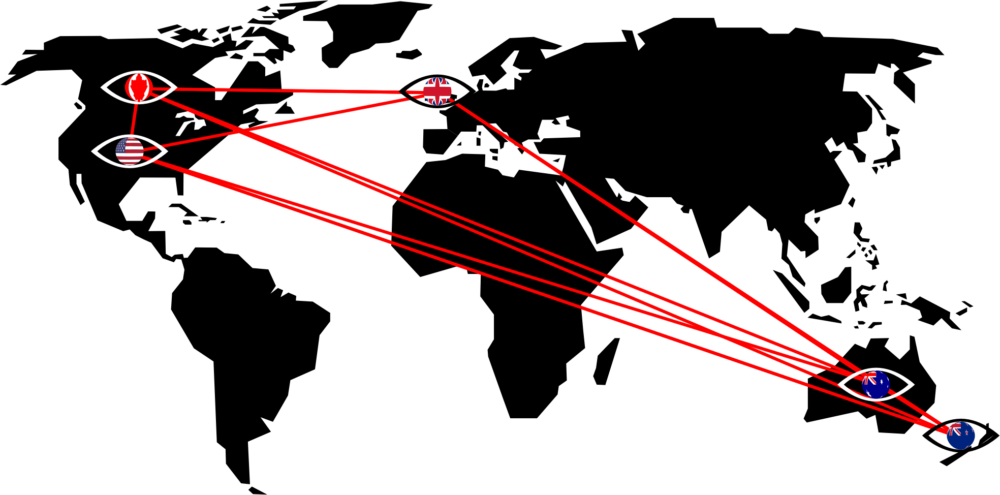
Rendering of the “Five Eyes” intelligence network that includes Australia, Canada, New Zealand, the U.K., the U.S. (@GDJ, Openclipart)
“The GCSB, operating at this more junior level, obviously couldn’t be sure that what it was doing was in accordance with the government’s intelligence requirements and with New Zealand law,” Clark said.
However, she concurred with the report’s findings that the MoU had been signed during a period of flux when there were acting leaders between 2010 and 2012, which had led to senior management subsequently not being aware of the U.S. signals intelligence operation. For Clark, “all checks and balances seem to have broken down.”
The latest report, much of which remains classified, makes it clear there was very little oversight into how the suspected U.S. signals operation was run and that it was impossible to determine whether it broke New Zealand law or that the intelligence enabled military targeting that broke international law.
The system was accessed remotely by the agency, with intercepted signals being passed on to it. The MoU stated the system would not be used to target New Zealanders and no communications would be collected from local telecom networks without a warrant.
Records showed 29 intelligence-gathering tasks ran between 2014 and 2020, but the true number performed is impossible to determine, as well as the nature of the information gathering.
The inspector general’s report found the ability of the intelligence to contribute to military action had been “moderated significantly by the geographical limits of GCSB collection.”
This suggests the potential to aid U.S. military operations was limited to the Pacific region, where New Zealand’s Western allies are preparing for a war with its chief trading partner China, one of several centres of power now challenging U.S. hegemony.
After Chinese Visit
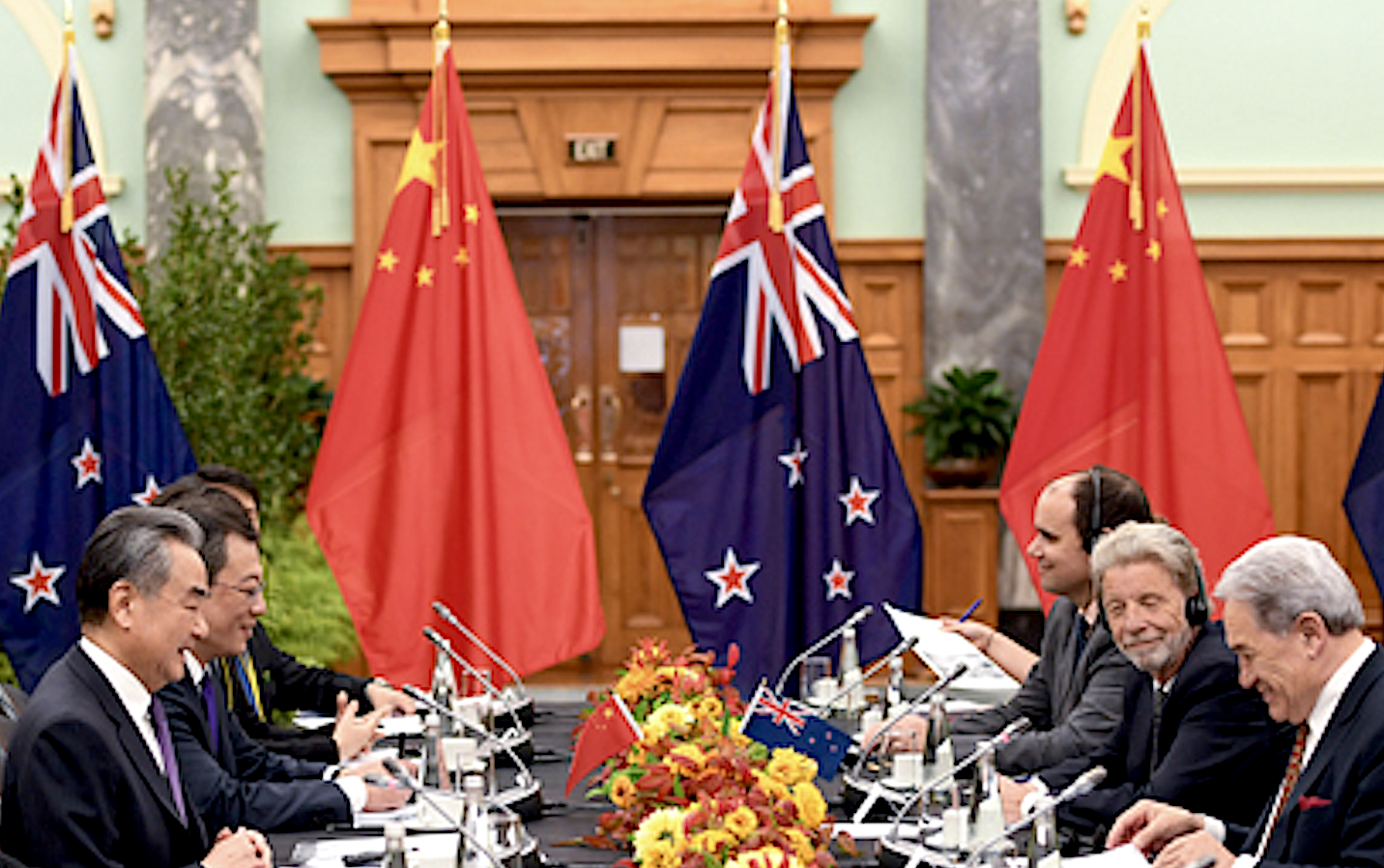
China’s Wang, left, holding talks with his New Zealand counterpart Winston Peters, right, on March 18. (Ministry of Foreign Affairs, the People’s Republic of China)
News of the operation came on the heels of a two-day visit to New Zealand by China’s Foreign Minister Wang Yi beginning on March 17 to discuss bilateral trade and cooperation in the Indo-Pacific. Wang also visited Australia afterwards on a similar diplomatic mission.
The suspected U.S. operation will be of concern to Beijing, regardless of the report’s finding that it was not politically approved, that it ended in 2020, and that, less plausibly, New Zealand’s senior spooks suddenly became unaware of it.
The inspector general’s report said then bureau director Simon Murdoch in 2011 had noted in an email that his legal team would need to be closely involved in the MoU process, as well the minister with oversight of the GCSB being made aware of it, with his consent also potentially needed.
However, the report found no evidence of any subsequent ministerial briefings or correspondence. It also noted that Ian Fletcher, appointed GCSB director in February 2012, said he was not told about the MoU during his transition into his new role.
The IG found no evidence Fletcher had been told. The report also said the GCSB’s current senior leadership and legal team had no knowledge of it either, suggesting institutional knowledge of the operation simply disappeared.
The report found this was due to poor internal procedures as well as multiple acting senior figures coming and going during the time after the MoU was signed, while lax rules governing the organisation had allowed senior spooks to avoid telling the government.
It said the spy system was only “rediscovered” following an audit in 2020 when equipment reportedly stopped working, after which the matter was referred to Horsley to probe.
Given the contradictions implicit in the report, questions remain over who knew what and whether the security state is continuing to accede to similar requests by the U.S. without the knowledge of government.
Senior Staff Awareness
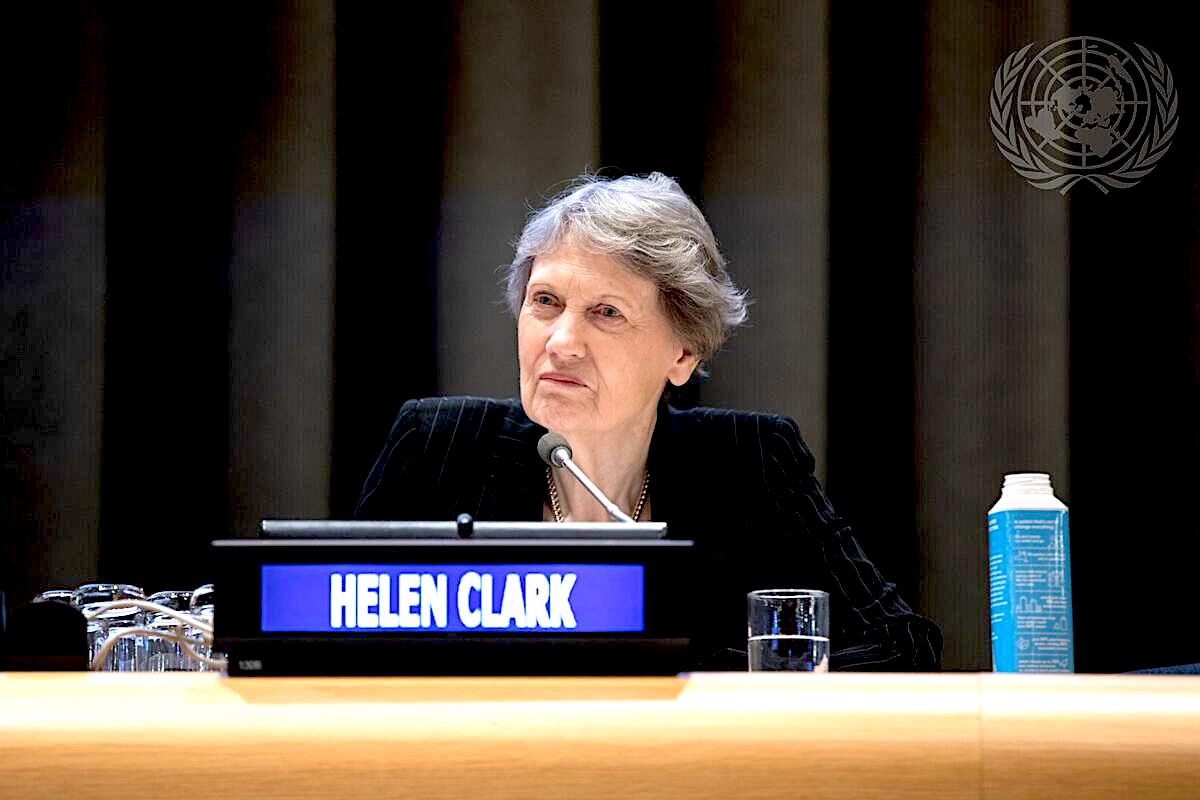
Clark at U.N. General Assembly event in September 2022. (UN Photo/Jaclyn Licht)
The report noted inadequate record keeping and lack of evidence to show staff ever queried the purpose of the requested tasks. It stated that in agreeing to host the system the GCSB did so with senior officials having “negligible” awareness of it and with staff running it having inadequate training or guidance.
Calls for Oversight
Auckland University senior law lecturer Fuimaono Dylan Asafo is calling for new laws to ensure proper oversight is imposed on the country’s spy agencies so any future government knows exactly what the security state is up to.
Speaking in his capacity as spokesperson for a foreign policy group Te Kuaka, Afaso said:
“This should be of major concern to all New Zealanders because we are not in control here. The inquiry reveals that our policies and laws are not fit for purpose and that they do not cover the operation of foreign agencies within New Zealand.
It appears from the inquiry that even GCSB itself lost track of the system and did not know its full purpose.
We do not know what military activities were undertaken using New Zealand’s equipment and base, and this could make us unknowingly complicit in serious breaches of international law. The law needs changing to explicitly prohibit what has occurred here.”
Te Kuaka has voiced increasing concerns over New Zealand joining “Pillar II” of AUKUS, the anti-China nuclear submarine alliance in the Asia-Pacfic involving Australia, the U.K. and the U.S.
[See: New Zealand Leaning to Controversial AUKUS Alliance]
Under law enacted in the late 1980s New Zealand is a nuclear-free zone, with nuclear-powered vessels and weaponry banned from entering its jurisdiction.
However, Pillar II is being pushed as a non-nuclear component of the pact, compatible with its anti-nuclear tradition. It is a distinction rendered meaningless by the fact Pillar II would involve intelligence sharing with AI-driven targeting systems and nuclear-capable assets, Te Kuaka argues.
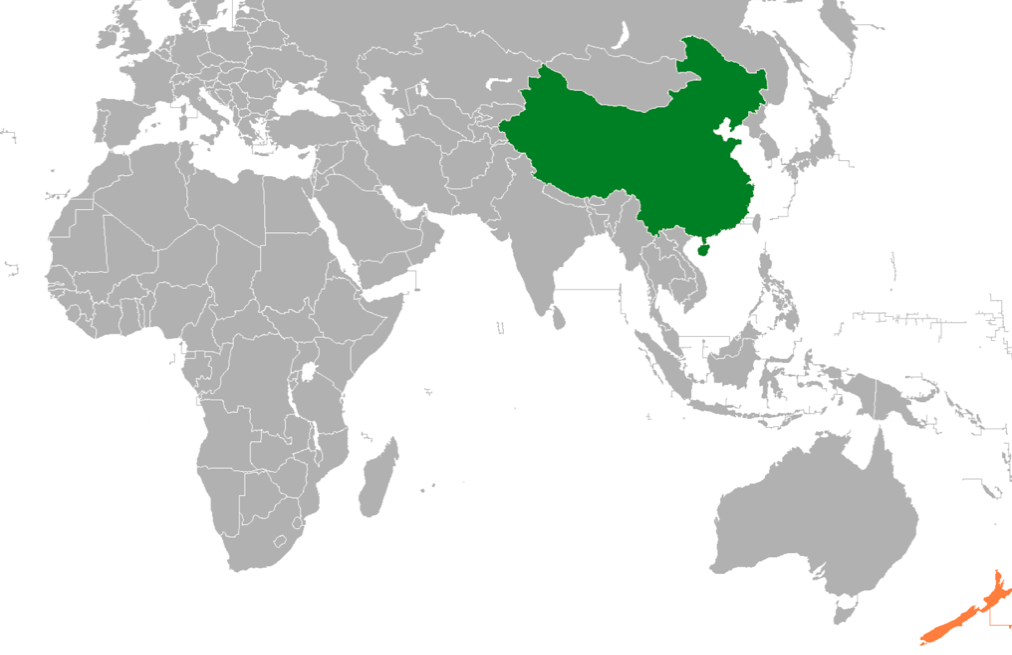
Map indicating locations of China and New Zealand. (Phoenix500, Wikimedia Commons, CC0)
While in Australia for a meeting of foreign and defence ministers in February, New Zealand Defence Minister Judith Collins strongly expressed a desire to join the alliance, although officials maintain the potential role is still being defined.
Pillar II aims to win a next-generation arms race involving new autonomous weapons platforms, electronic warfare systems, and hypersonic missiles.
Asafo’s colleague, Te Kauka Co-director Marco de Jong, said any involvement in AUKUS would compound problems of democratic oversights Horsley’s inquiry had raised, creating further distrust across an increasingly divided region over New Zealand’s ability to avoid becoming entangled in “other people’s wars.”
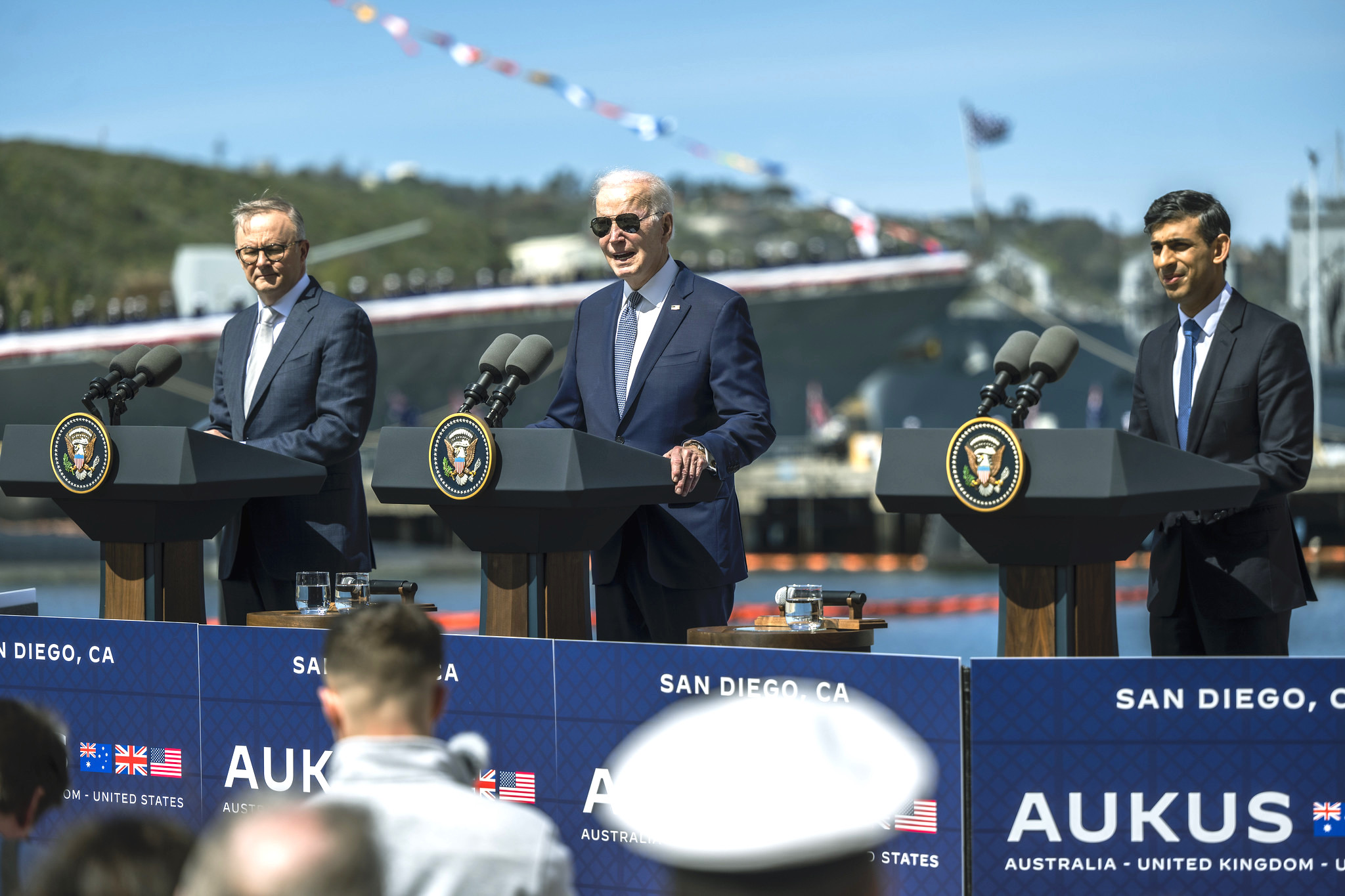
Australian Prime Minister Anthony Albanese, U.S. President Joe Biden and British Prime Minister Rishi Sunak at a press event for AUKUS in San Diego, March 13, 2023. (DoD photo by Chad J. McNeeley)
It could be argued joining AUKUS could comprehensively restrict the government’s ability to shape how its military and the GCSB directed their efforts, which would be largely driven by foreign policy in Washington.
Andrew Little, a former minister who was previously in charge of the GCSB, told media the GCSB had a “much different attitude since the MoU was signed, regarding complying with legal obligations and relationship with ministers with oversight. He said he supported the operation being directed to Horley to investigate after becoming aware of it, because he was concerned it was inconsistent with legislation that tightened oversight that had taken effect in 2017.
However, Asafo points out:
“Regardless of suggestions the system was established under previously lax legislation, its operation continued through several agency and legislative reviews.”
Horley’s report stated the bureau acted legally. It stated:
“Though the authorisation process for intelligence sharing at the time seems manifestly inadequate, a Ministerial authorisation in place in 2012 for the GCSB to share intelligence and cooperate with the foreign partner was broad enough to cover the capability and so the decision to host the system without further Ministerial approval was lawful.”
However, it seems clear failure to bring it to the relevant minister’s attention wilfully circumvented government oversight and control over its activities.
In doing so, New Zealand’s security state likely allowed U.S. military intelligence to usurp its government’s democratic checks and balances so it could pursue actions against other states and individuals possibly nefarious in nature.
The corrosive effects of such secrecy remain hard to quantify in a country under pressure to give up what’s left of its independent foreign policy altogether by joining a military alliance that would more openly enmesh it in schemes of U.S. domination against its Pacific neighbours for years to come.
Mick Hall is an independent journalist based in New Zealand. He is a former digital journalist at Radio New Zealand (RNZ) and former Australian Associated Press (AAP) staffer, having also written investigative stories for various newspapers, including the New Zealand Herald.
Views expressed in this article and may or may not reflect those of Consortium News.

hxxps://www.aljazeera.com/news/2024/3/26/australias-abc-staffs-concerns-over-gaza-bias-revealed
If only RNZ journos showed such spine when Mick Hall pointed this stuff out.
Makes me wonder if the reason they “became aware of it” is because the Chinese said to them “do you know what they are doing with that installation?” … if so, good on the Chinese for alerting them to it, but I doubt the leaders in Australia & New Zealand have the required stones to disobey their masters, they all seem utterly cowardly & ethically bankrupt to me, though I will be extremely happy if they prove me wrong
I’m more worried about the Yanks spying on us than the Chinese.
The full import of this news has not been plumbed.
First, Helen Clark was a communist at age 18, when she worked for the Revolutionary Bookshop in Auckland in the mid-1960s and the evidence suggests she never changed her philosophy. Rising through NZ Labour Party ranks she became PM, having support in the right places in the UN and WEF; as did Adern. She has had full knowledge of these developments and her current appointment has always been part of the deal. In her current wide-eyed wonderment, she is being transparently disingenuous. One wonders what is behind this. But there are other considerations.
Five Eyes primarily spies on its own. Helen knows this.
Third, the Five Eyes and adjacent spy facilities, at least three to my limited knowledge, will be targets of the first ten reprisal or pre-emptive missile strikes from China when the US finally engages its 2015 Rand Report war plan to defeat China. Thus, Blenheim, Foxton, and Darwin will cease to exist. Darwin, in particular, is the nerve centre of at least 12 US military facilities, including the Gulkula RTX missile launching facility in NE Arnhem Land, which will probably be the first-strike-site. The resultant chlorine gas cloud will drift across the Gove peninsula killing 4000 people in Nhulunbuy town.
The strategic significance of this is that the US presence is the sole reason for China to attack these countries. How does this begin to make sense? Without the “protection” of America, neither nation actually needs a military. The paranoid hawkes who point quivering fingers at China seem oblivious to the rather more obvious reality that China is not about to attack its own investments; which are massive.
The only part of this scenario that resonates is that the same insanity is visited to the rest of the world; like Goya’s “Saturn Devouring his Children”, the dying leviathan is destroying all in its death throes. Every nation needs to disengage if it wants to survive.
Western societies are descending into corporate models of information and power management. Most of you have seen some part of it in your various travels through the business world. It’s a bit of an update on the old Leninist avant-garde cells, ironically.
Departments and sub-departments at however many levels are divided by the sort of tasks they accomplish. Information is largely limited to what accomplishes the task. This includes cultural information and a narrative around ethics. Each level of management knows an interface between departments at its level. High management has an overview of the entire operation, but a view that is incorrect because it lacks technical detail and empathy.
An example of this is the operation of a nuclear power plant. Engineers and management tend to imagine that they understand how the whole plant works, in some rough sense, but neither does, because each is largely kept from the information of the other. The Leninist cells did something like this to avoid release of information under torture. And, to some extent, it is a natural feature of large and complex operations. But it is also undertaken to avoid dissent over systemic problems of the organization.
This becomes a major problem for lieutenantship, as a social strategy, for nations as well as for lieutenants. New Zealand parts with a measure of its autonomy in return for alliance with a larger military power. Someone sees this as undertaken to avoid threats from China, surely, but in fact it mostly avoids threats from the United States, as it would in any other protection racket. Yet its efficacy in this is limited because New Zealand does not receive information about how the dominant power manages it.
The US seems totally unable to operate on the ‘up and up’. Daily dose of dishonesty.
Undermining other countries’s sovereignty is what this sprawling empire does. It’s about time the other Western allied countries figured this out.
Countries that bargain with the devil get what they deserve. Well, their politicians who made the bargain deserve it, not the commoners.